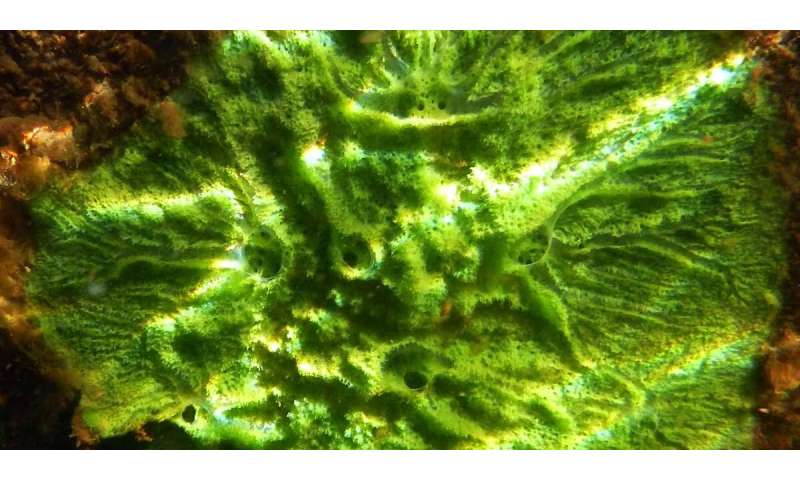
Scientists have completed the first chromosomal-level genome sequence for a freshwater sponge—offering insight into how the sponge has evolved over 600 to 800 million years, and possibly leading to genetic tools to tackle challenges in maintaining clean freshwater and human health.
"This research provides an amazing window into the genetic features of early animals—and helps us understand how they lived, and became so successful," said marine biologist Sally Leys, who was the senior author of the study.
The sponge, called Ephydatia muelleri, can be found in almost any lake, river, pond or canal across the northern hemisphere. As filter feeders, freshwater sponges are integral for cleaning our waterways, and have evolved to live in extreme conditions over the last 30 million years.
"Sponges have almost twice as many genes as humans, and we only know what a fraction of these might do," said Nathan Kenny, a post-doctoral fellow at Oxford Brookes University in the United Kingdom who led the study.
"We don't have to go to space to find things that are alien to us—we can look at what the novel genes in sponges are doing," Kenny noted. "And because sponges are related to us, though very distantly, we might discover tricks sponges use to deal with problems such as controlling cell growth or protecting themselves from harmful bacteria, which then could be used to treat human diseases."
Currently, scientists have few tools to help assess what Earth's earliest animals were like, or how some animals adjusted to live in freshwater after originating in the oceans.
The researchers said this study provides foundational data that is critical for examining these problems in depth, including the near complete sequencing of the 23 individual chromosomes, as well as the identification of mechanisms that turn genes on or off and the method by which this sponge was able to transition to freshwater environments. The research also identified tiny microorganisms that live inside the sponges, helping them survive in freshwater.
The study, "Tracing Animal Genomic Evolution With the Chromosomal-Level Assembly of the Freshwater Sponge Ephydatia muelleri," was published in Nature Communications.
Citation: Researchers complete first-ever chromosomal-level genome sequencing of a freshwater sponge (2020, July 28) retrieved 28 July 2020 from https://ift.tt/2Dgowdn
This document is subject to copyright. Apart from any fair dealing for the purpose of private study or research, no part may be reproduced without the written permission. The content is provided for information purposes only.
"complete" - Google News
July 28, 2020 at 08:06PM
https://ift.tt/2Dgowdn
Researchers complete first-ever chromosomal-level genome sequencing of a freshwater sponge - Phys.org
"complete" - Google News
https://ift.tt/2Fvz4Dj
https://ift.tt/2YviVIP

No comments:
Post a Comment